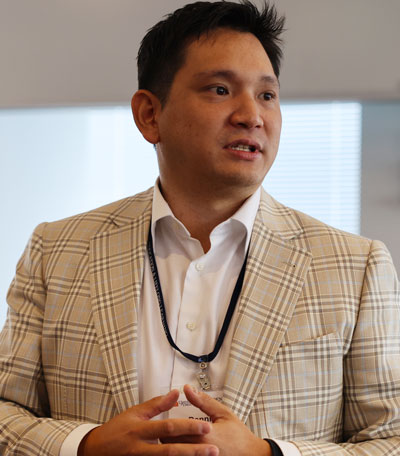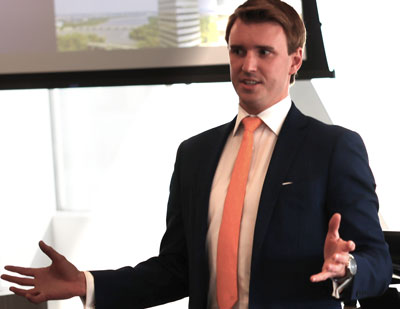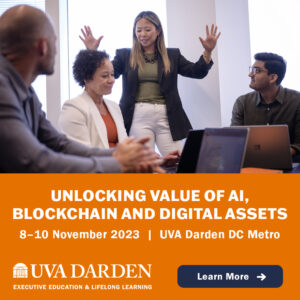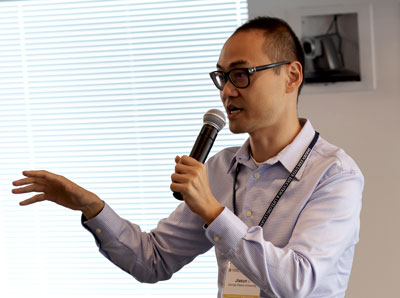Darden Conference Explores Blockchain Opportunities, Risks
By Tom van der Voort

Professor Dennie Kim kicks off the conference.
Still in its infancy, the world of cryptocurrency, nonfungible tokens (NFTs) and blockchain technology can be a vexing mystery for many. But when experts gathered at Darden DC Metro in Rosslyn, Virginia, in early June to exchange ideas, information, and insight, two main themes emerged: The need for clear rules and regulations from the government and the relentless search for viable use cases for what amounts to a decentralized, reliable and private record-keeping system.
Dencentralizations: Unlocking Stakeholder Value With Blockchain Technology brought together experts in blockchain and members of the Darden community, including faculty, students and staff, for a day of presentations, panels and conversation. Sponsored by the Sands Institute for Lifelong Learning and organized by Professor Dennie Kim and Anne Trumbore, Chief Digital Learning Officer of the Sands Institute, the conference delivered new understandings and a longer-term perspective for a highly engaged group of practitioners, academics and students.
Darden Offers New Course on Blockchain, AI, and Digital Assets
Irregular Regulation
Industry representatives identified one clear stumbling block for blockchain innovators: the lack of a predictable regulatory environment. Ron Hammond, the director of government relations for the Blockchain Association, said that after years of little to no input by the federal government, basic questions remain unanswered, such as which blockchain assets are securities and which are commodities.

Ron Hammond, director of government relations for the Blockchain Association
With the high-profile fraud and failure of FTX in the background, federal agencies have become active, but the rules are still unclear. “It’s now regulation by speech or it’s regulation by enforcement,” Hammond said. “That’s the only way leaders in this industry can grapple with what they can and can’t do.” Though Congress is finally informed enough to legislate, he added, time is of the essence before innovators begin to move out of the United States.
In contrast, the European Union has passed “a pretty balanced law” with clear rules with room to innovate, while Singapore allows companies to work closely with regulators to ensure compliance.
In fact, the E.U. recently announced the first cohort in a “Blockchain Sandbox,” set up to “facilitate the dialogue between regulators and innovators for private and public sector use cases.” Each year, the initiative will invite 20 innovative ventures to receive advice and regulatory guidance “in a safe and confidential environment.”
 But there are signs of progress stateside. A bill regulating stablecoins, digital currencies pegged to a currency, commodity or other financial instrument, has garnered bipartisan support. “What we see in the stablecoin bill itself are a lot of the key elements that, quite frankly, are needed,” said Andrew Galluci of Circle, a U.S. dollar-denominated stablecoin.
But there are signs of progress stateside. A bill regulating stablecoins, digital currencies pegged to a currency, commodity or other financial instrument, has garnered bipartisan support. “What we see in the stablecoin bill itself are a lot of the key elements that, quite frankly, are needed,” said Andrew Galluci of Circle, a U.S. dollar-denominated stablecoin.
Recently Senators Cynthia Lummis (R-Wyo.) and Kirsten Gillibrand (D-N.Y.) reintroduced a more comprehensive measure, the Responsible Financial Innovation Act, which covers more ground but would require the input of multiple congressional committees.
Stability could also come from the private sector. “I think the industry itself recognizes that people are going to adopt this technology more widely,” said Sarah Milby of the Blockchain Association, “and it needs to be easier for people to access, and stable for those individuals that are using it. So we are seeing an emerging section of the crypto space that is doing regulatory technology — reg tech — and almost self-imposing regulation.”
The bottom line: Clear and well-crafted rules would both protect consumers and allow for innovation. And predictability here can serve as a counterweight to the chaos and risk inherent in this rapidly evolving sector. But it’s important to act soon, even in a politically challenging environment.
Less Friction, More Trust: A Search for “Use Cases”
Between the uncritical boosters and irredeemable cynics that often dominate popular discussions about “crypto”, the conference revealed a robust ecosystem of blockchain innovators, funders and entrepreneurs looking for value. They believe in the potential of the technology but acknowledge that paths to success haven’t been clearly established. Rabia Iqbal, managing partner at Nural Capital, believes it’s foolish to bet against technology in the long run, but said that when it comes to use cases, “We’re not there yet.”
Christian Duffus (MBA ’00), founder and CEO of Fonbnk, returns to basics in his search for value. Distributed Ledger Technology (DLT), sounds simple enough, but the level of trust blockchains allow can address longstanding problems in sensitive areas such as finance and medical records. “It’s a fundamental technology for things we hold dear,” he said. And challenges to privacy and verification, which blockchain is well-positioned to address, are only growing with the rise of Artificial Intelligence.
One clear opportunity lies in providing access to capital, and to the global economy itself, for those who live in remote or unstable places. Theoretically, trustworthy cryptocurrencies can increase access and reduce transaction costs everywhere, but that need is less obvious in the U.S. For many across the globe, however, a reliable and accessible currency that provides both a store of value and medium of exchange is breakthrough technology.
Patience, however, is required. “We are still in the planting-seeds phase of this technology. The last thing you want to do is optimize for profitability at the expense of building,” said Duffus. “We literally are planting seeds across a green field market opportunity where if you don’t have financial services, a crypto wallet might be your only financial services for the rest of your life.”
“There are some very clear use cases that are getting more traction,” said Gallucci, “things like conducting refugee payments using blockchain, tokenizing property deeds, warranties, and other interesting applications.”
Much of the potential comes from the power of blockchains to verify information in an age where the truth itself seems frequently in question. Online, for example, it’s hard to know if a real person is taking a real action. It’s hard to know if an image reflects reality or is just a digital creation. Those difficulties will only get worse as the power of Generative AI increases. “Blockchain has the potential to add a critical element of verification to AI,” said Iqbal. “If AI develops on a foundation that has cracks, I think it could really hurt society.”
Darden Fosters Understanding, Connection

Professor Jiasun Li of George Mason University
At Darden and other business schools, faculty are creating foundational knowledge to underpin blockchain technology and promote its responsible use. And they’re educating current and future leaders about how to manage it. The Decentralizations conference highlighted basic research from Darden faculty Dennie Kim, Michael Albert, and Rupert Freeman as well as Alex Murray of the University of Oregon and Jiasun Li of George Mason University.
Taken as a whole, the conference was proof of the power of lifelong learning to present leaders with new information and perspectives. “There are conversations that are going to affect society and business that cannot be solely had by the technologists,” said Kim. “It affects every single one of us.”
Added Anne Trumbore of the Sands Institute, “Business schools are uniquely positioned to bring together cutting edge research and practice to affect change. The Sands Institute was created to connect learners and business with the research that matters most, as well as to bring current innovations to researchers so that their work is informed by the latest real world practices. This conference is a perfect example of the power of those connections.”
The University of Virginia Darden School of Business prepares responsible global leaders through unparalleled transformational learning experiences. Darden’s graduate degree programs (MBA, MSBA and Ph.D.) and Executive Education & Lifelong Learning programs offered by the Darden School Foundation set the stage for a lifetime of career advancement and impact. Darden’s top-ranked faculty, renowned for teaching excellence, inspires and shapes modern business leadership worldwide through research, thought leadership and business publishing. Darden has Grounds in Charlottesville, Virginia, and the Washington, D.C., area and a global community that includes 18,000 alumni in 90 countries. Darden was established in 1955 at the University of Virginia, a top public university founded by Thomas Jefferson in 1819 in Charlottesville, Virginia.
Press Contact
Molly Mitchell
Senior Associate Director, Editorial and Media Relations
Darden School of Business
University of Virginia
MitchellM@darden.virginia.edu





